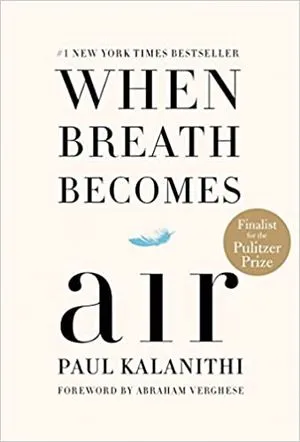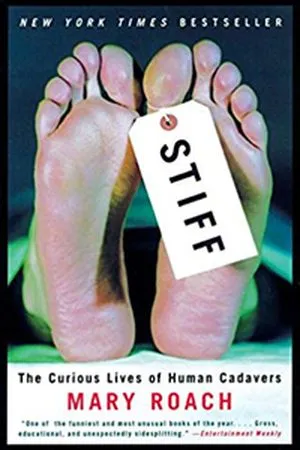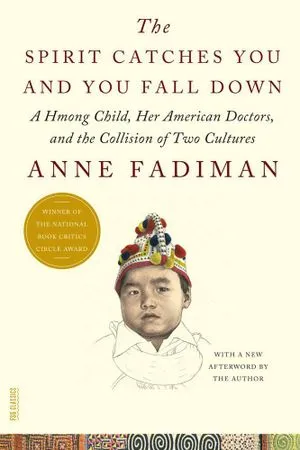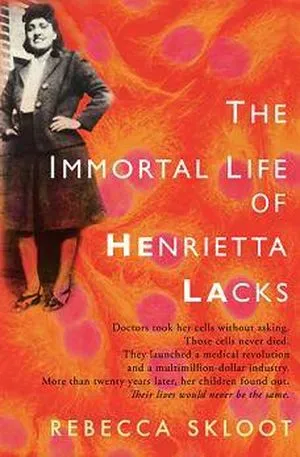
50 Books to Read if You Love Medicine
I wasn’t always a writer. As a preteen, I wanted to be a pediatric oncologist, a dream that continues today. My love of medicine and people propelled me toward psychology, then public health, where I could combine everything into fields like psychosocial oncology and perinatal psychology. My not-so-secret desire to be a doctor, though, has never really gone away. At this point, I have accepted that my graduate school loans are sizable enough, and my life no longer has room for the possibility of ever going to medical school – and besides, when I did take some prerequisites, although I love reading medical textbooks, my brain just does not like rote memorization…which is a problem in the biological sciences. But I still love reading about medicine, doctoring, and anything in the medical field in medical books.
Here, in no particular order, are 50 must-read and best medical books. I like to think that if you devour reruns of ER and House, that you’ll like these, too. They’re mostly books about medicine that are nonfiction, with fiction marked with a (*) and forthcoming books marked (**).

When Breath Becomes Air by Paul Kalanithi
One of my favorites. “At the age of thirty-six, on the verge of completing a decade’s worth of training as a neurosurgeon, Paul Kalanithi was diagnosed with stage IV lung cancer. One day he was a doctor treating the dying, and the next he was a patient struggling to live. And just like that, the future he and his wife had imagined evaporated.”
House of God* by Samuel Shem
The classic novel about doctors – Grey’s Anatomy before Grey’s Anatomy.
Complications: A Surgeon’s Notes on an Imperfect Science by Atul Gawande
“In gripping accounts of true cases, surgeon Atul Gawande explores the power and the limits of medicine, offering an unflinching view from the scalpel’s edge. Complications lays bare a science not in its idealized form but as it actually is―uncertain, perplexing, and profoundly human.”
The Intern Blues by Robert Marion
One of the truest books on medicine I’ve ever read. It should be required reading for anyone considering a career in medicine. “While supervising a small group of interns at a major New York medical center, Dr. Robert Marion asked three of them to keep a careful diary over the course of a year. Andy, Mark, and Amy vividly describe their real-life lessons in treating very sick children; confronting child abuse and the awful human impact of the AIDS epidemic; skirting the indifference of the hospital bureaucracy; and overcoming their own fears, insecurities, and constant fatigue. Their stories are harrowing and often funny; their personal triumph is unforgettable.”
The Anatomy of Hope by Jerome Groopman
The first time I read this, I kept it in my bag for months, carrying it around with me. “This profound exploration begins when Groopman was a medical student, ignorant of the vital role of hope in patients’ lives–and it culminates in his remarkable quest to delineate a biology of hope. With appreciation for the human elements and the science, Groopman explains how to distinguish true hope from false hope–and how to gain an honest understanding of the reach and limits of this essential emotion.”
My Own Country: A Doctor’s Story by Abraham Verghese
“Nestled in the Smoky Mountains of eastern Tennessee, the town of Johnson City had always seemed exempt from the anxieties of modern American life. But when the local hospital treated its first AIDS patient, a crisis that had once seemed an “urban problem” had arrived in the town to stay.”
The Immortal Life of Henrietta Lacks by Rebecca Skloot
Read the book instead of seeing the movie. “Her name was Henrietta Lacks, but scientists know her as HeLa. She was a poor black tobacco farmer whose cells—taken without her knowledge in 1951—became one of the most important tools in medicine, vital for developing the polio vaccine, cloning, gene mapping, and more. Henrietta’s cells have been bought and sold by the billions, yet she remains virtually unknown, and her family can’t afford health insurance. This phenomenal New York Times bestseller tells a riveting story of the collision between ethics, race, and medicine; of scientific discovery and faith healing; and of a daughter consumed with questions about the mother she never knew.”
Intern: A Doctor’s Initiation by Sandeep Jauhar
“Residency―and especially its first year, the internship―is legendary for its brutality, and Jauhar’s experience was even more harrowing than most. He switched from physics to medicine in order to follow a more humane calling―only to find that his new profession often had little regard for patients’ concerns. He struggled to find a place among squadrons of cocky residents and doctors. He challenged the practices of the internship in The New York Times, attracting the suspicions of the medical bureaucracy. Then, suddenly stricken, he became a patient himself―and came to see that today’s high-tech, high-pressure medicine can be a humane science after all.”
White Coat: Becoming a Doctor at Harvard Medical School by Ellen Rothman
“…Ellen Rothman offers a vivid account of her four years at one of the best medical schools in the country, and opens the infamously closed door between patient and doctor. Touching on today’s most important medical issues — such as HMOs, AIDS, and assisted suicide — the author navigates her way through despair, exhilaration, and a lot of exhaustion in Harvard’s classrooms and Boston’s hospitals to earn the indisputable title to which we entrust our lives.”
This Side of Doctoring: Reflections from Women in Medicine by Eliza Lo Chin
This is one of my all-time favorites. I could read this over and over and over. “Written over the last century and a half, this collection of personal stories, poems, essays, and quotations reveals the intimate lives of over a hundred female physicians. There are touching testimonies from early 19th-century medical pioneers like Elizabeth Blackwell, the first woman to graduate from medical school and Harriet Hunt, who had her own practice that catered to women and children yet was never formally trained, to modern-day medical students and doctors. Poignant and compelling, these narratives offer insights into the struggles and triumphs of women in medicine. Much like an American quilt, this book is a unique and richly textured patchwork of each woman’s extraordinary life and career. This assemblage of so many different voices exemplifies the varied paths that women have created within the medical profession. Together they stand as an enduring tribute to the dedication of all women physicians to both their patients and their families.”
The Emperor of All Maladies: A Biography of Cancer by Siddhartha Mukherjee
As someone who used to study oncology, I’ve read many books on cancer. This remains one of my favorites – and in my opinion, one of the best. “Physician, researcher, and award-winning science writer, Siddhartha Mukherjee examines cancer with a cellular biologist’s precision, a historian’s perspective, and a biographer’s passion. The result is an astonishingly lucid and eloquent chronicle of a disease humans have lived with—and perished from—for more than five thousand years.”
A Not Entirely Benign Procedure: Four Years as a Medical Student by Perri Klass
“Acclaimed pediatrician, journalist, and novelist Perri Klass offers a provocative look at the ups and downs of medical school – from those first exams to the day she became a doctor. In a direct, candid style, Klass shares what it is like to be a first-time mother while attending med school; the unique lingo of the med student; how to deal with every bodily fluid imaginable; and the humor and heartbreak of working with patients.”
Final Exam: A Surgeon’s Reflections on Mortality by Pauline Chen
“When Pauline Chen began medical school, she dreamed of saving lives. What she could not predict was how much death would be a part of her work. Almost immediately, she found herself wrestling with medicine’s most profound paradox–that a profession premised on caring for the ill also systematically depersonalizes dying. Final Exam follows Chen over the course of her education and practice as she struggles to reconcile the lessons of her training with her innate sense of empathy and humanity.”
Becoming a Doctor: A Journey of Initiation in Medical School by Melvin Konner
One of my favorites, for sure. Konner went back to med school mid-career, and his observations on the med school experience are insightful, important, and much needed, even today.
The Real Grey’s Anatomy: A Behind-the-Scenes Look at the Real Lives of Surgical Residents by Andrew Holz
“How much of the medical drama seen in Grey’s Anatomy is pure entertainment, and how much is an accurate reflection of life both in and out of the OR? Here, a well-known medical journalist provides some answers. He examines a group of new surgical residents at a major teaching hospital in the Pacific Northwest as they tackle the roller-coaster ride of long hours, fascinating procedures, mundane office tasks, and emotional ups and downs that comprise the life of a student of surgery.”
Something for the Pain: One Doctor’s Account of Life and Death in the ER by Paul Austin
“In this eye-opening account of life in the ER, Paul Austin recalls how the daily grind of long, erratic shifts and endless hordes of patients with sad stories sent him down a path of bitterness and cynicism. His own life becomes Exhibit A, as he details the emotional detachment that estranges him from himself and his family. Gritty, powerful, and ultimately redemptive, Austin’s memoir is a revealing glimpse into the fragility of compassion and sanity in the industrial setting of today’s hospitals.”
On Call: A Doctor’s Days and Nights in Residency by Emily Transue
“During her first week as a student on the medical wards, Dr. Transue watched someone come into the emergency room in cardiac arrest and die. Nothing like this had ever happened to her before-it was a long way from books and labs. So she began to record her experiences as she gained confidence putting her book knowledge to work.”
One Doctor: Close Calls, Cold Cases, and the Mysteries of Medicine by Brendan Reilly
“In compelling first-person prose, Dr. Brendan Reilly takes readers to the front lines of medicine today. Whipsawed by daily crises and frustrations, Reilly must deal with several daunting challenges simultaneously. As Reilly’s patients and their families survive close calls, struggle with heartrending decisions, and confront the limits of medicine’s power to cure, One Doctor lays bare a fragmented, depersonalized, business-driven health care system where real caring is hard to find. Every day, Reilly sees patients who fall through the cracks and suffer harm because they lack one doctor who knows them well and relentlessly advocates for their best interests. Filled with fascinating characters in New York City and rural New England—people with dark secrets, mysterious illnesses, impossible dreams, and limitless courage—One Doctor tells their stories with sensitivity and empathy, reminding us of professional values once held dear by all physicians.”
Body of Work: Meditations on Mortality from the Human Anatomy Lab by Christine Montross
Another favorite of mine. “Medical student Christine Montross felt nervous standing outside the anatomy lab on her first day of class. Entering a room with stainless-steel tables topped by corpses in body bags was initially unnerving. But once Montross met her cadaver, she found herself intrigued by the person the woman once was and fascinated by the strange, unsettling beauty of the human form. They called her Eve. The story of Montross and Eve is a tender and surprising examination of the mysteries of the human body, and a remarkable look at our relationship with both the living and the dead.”

Stiff: The Curious Lives of Human Cadavers by Mary Roach
“For two thousand years, cadavers―some willingly, some unwittingly―have been involved in science’s boldest strides and weirdest undertakings. In this fascinating account, Mary Roach visits the good deeds of cadavers over the centuries and tells the engrossing story of our bodies when we are no longer with them.”
Direct Red: A Surgeon’s View of Her Life-or-Death Profession by Gabriel Weston
A beautiful book about what really happens in the OR.
Hospital by Julie Salamon
I have read this at least 5 times – the reporting and storytelling is so wonderful. “A warts-and-all exploration of the struggles suffered and triumphs achieved by America’s health-care professionals, Hospital follows a year in the life of Maimonides Medical Center in Brooklyn, which serves a diverse multicultural demographic. Unraveling the financial, ethical, technological, sociological, and cultural challenges encountered every day, bestselling author Julie Salamon tracks the individuals who make this complex hospital run-from doctors, patients, and administrators to nurses, ambulance drivers, cooks, and cleaners.”
Kill as Few Patients as Possible by Oscar London
“This oft-quoted all-time favorite of the medical community will gladden–and strengthen–the hearts of patients, doctors, and anyone entering medical study, internship, or practice. With unassailable logic and rapier wit, the sage Dr. Oscar London muses on the challenges and joys of doctoring, and imparts timeless truths, reality checks, and poignant insights gleaned from 30 years of general practice–while never taking himself (or his profession) too seriously.”
Cutting For Stone* by Abraham Verghese
“Marion and Shiva Stone are twin brothers born of a secret union between a beautiful Indian nun and a brash British surgeon. Orphaned by their mother’s death and their father’s disappearance, bound together by a preternatural connection and a shared fascination with medicine, the twins come of age as Ethiopia hovers on the brink of revolution.”
How We Die by Sherwin Nuland
Another all-time favorite of mine. A compelling examination and explanation of how the body permanently shuts down in a variety of situations.
How We Live by Sherwin Nuland
“How We Live is filled with gripping medical case histories: a woman is pulled back from the brink of death from inexplicable internal bleeding; another patient triumphs over breast cancer; the “routine” removal of a polyp triggers a nearly lethal medical crisis. For Nuland, each of these cases serves to illustrate the extraordinary responsiveness and adaptability of the human organism. We learn how the aorta’s baroreceptors monitor blood pressure and respond to its minutest fluctuations. We follow the intricate chain of electrochemical command that makes us leap out of the path of a speeding car. We discover why the stomach—which is capable of breaking down everything from porridge to pizza—refrains from digesting itself. Informed by sympathy for human suffering and an erudition that includes poetry and the Talmud as well as the medical canon, How We Live is science writing of the rarest kind—lucid, poetic, and genuinely uplifting.”
The Way We Die Now: The View from Medicine’s Front Line ** by Seamus O’Mahony
“Dying has become medicalized and sanitized, but doctors cannot prescribe a “good death.” The Way We Die Now asks us to consider how we have gotten to this age of spiritual poverty and argues that giving up our fantasies of control over death can help restore its significance.”
The Measure of Our Days: A Spiritual Exploration of Illness by Jerome Groopman
“In these eight moving portraits, he offers us a compelling look at what is to be learned when life itself can no longer be taken for granted.”

The Spirit Catches You and You Fall Down by Anne Fadiman
“The Spirit Catches You and You Fall Down explores the clash between a small county hospital in California and a refugee family from Laos over the care of Lia Lee, a Hmong child diagnosed with severe epilepsy. Lia’s parents and her doctors both wanted what was best for Lia, but the lack of understanding between them led to tragedy.”
Wit* by Margaret Edson
“Margaret Edson’s powerfully imagined Pulitzer Prize–winning play examines what makes life worth living through her exploration of one of existence’s unifying experiences―mortality―while she also probes the vital importance of human relationships. What we as her audience take away from this remarkable drama is a keener sense that, while death is real and unavoidable, our lives are ours to cherish or throw away―a lesson that can be both uplifting and redemptive.”
Letters to a Young Doctor by Richard Selzer
“Highly candid, insightful, and unexpectedly humorous essays on both the brutality and the beauty of the profession in which saving and losing lives is all in a day’s work. A timeless collection by the “best of the writing surgeons” (Chicago Tribune).”
The Lives of a Cell: Notes of a Biology Watcher by Lewis Thomas
“Elegant, suggestive, and clarifying, Lewis Thomas’s profoundly humane vision explores the world around us and examines the complex interdependence of all things. Extending beyond the usual limitations of biological science and into a vast and wondrous world of hidden relationships, this provocative book explores in personal, poetic essays to topics such as computers, germs, language, music, death, insects, and medicine.”
The Man Who Mistook His Wife for a Hat by Oliver Sacks
A classic in the field of neurology. If you read one book by Sacks, make it this one.
The Illness Narratives: Suffering, Healing, and the Human Condition by Arthur Kleinman
“Based on twenty years of clinical experience studying and treating chronic illness, a Harvard psychiatrist and anthropologist argues that diagnosing illness is an art tragically neglected by modern medical training, and presents a compelling case for bridging the gap between patient and doctor.”
The Human Side of Cancer: Living With Hope, Coping With Uncertainty by Jimmie Holland
This book was my bible when I worked in psycho-oncology. Dr. Holland is the founder of the field, and she’s just brilliant.
When the Air Hits Your Brain: Tales from Neurosurgery by Frank Vertosick, Jr.
“With poignant insight and humor, Frank Vertosick Jr., MD, describes some of the greatest challenges of his career, including a six-week-old infant with a tumor in her brain, a young man struck down in his prime by paraplegia, and a minister with a .22-caliber bullet lodged in his skull. Told through intimate portraits of Vertosick’s patients and unsparing yet fascinatingly detailed descriptions of surgical procedures, When the Air Hits Your Brain―the culmination of decades spent struggling to learn an unforgiving craft―illuminates both the mysteries of the mind and the realities of the operating room.”
Dying Well: Peace and Possibilities at the End of Life by Ira Byock
“Through the true stories of patients, he shows us that a lot of important emotional work can be accomplished in the final months, weeks, and even days of life. It is a companion for families, showing them how to deal with doctors, how to talk to loved ones—and how to make the end of life as meaningful and enriching as the beginning.”
A Stitch of Time: The Year a Brain Injury Changed My Language and Life by Lauren Marks
“Lauren Marks was twenty-seven, touring a show in Scotland with her friends, when an aneurysm ruptured in her brain and left her fighting for her life. She woke up in a hospital soon after with serious deficiencies to her reading, speaking, and writing abilities, and an unfamiliar diagnosis: aphasia. This would be shocking news for anyone, but Lauren was a voracious reader, an actress, director, and dramaturg, and at the time of the event, pursuing her PhD. At any other period of her life, this diagnosis would have been a devastating blow. But she woke up…different.”
The Gene: An Intimate History by Siddhartha Mukherjee
“…In this biography Mukherjee brings to life the quest to understand human heredity and its surprising influence on our lives, personalities, identities, fates, and choices.”
How We Do Harm: A Doctor Breaks Ranks About Being Sick in America by Otis Webb Brawley
“…exposes the underbelly of healthcare today―the overtreatment of the rich, the under treatment of the poor, the financial conflicts of interest that determine the care that physicians provide, insurance companies that don’t demand the best (or even the least expensive) care, and pharmaceutical companies concerned with selling drugs, regardless of whether they improve health or do harm.”
Blue Collar, Blue Scrubs: The Making of a Surgeon by Michael Collins
“…taking readers from his days as a construction worker to his entry into medical school, expertly infusing his journey to become a doctor with humanity, compassion, and humor. From the first time he delivers a baby to being surrounded by death and pain on a daily basis, Collins compellingly writes about how medicine makes him confront, in a very deep and personal way, the nature of God and suffering―and how delicate life can be.”
I Knew A Woman: Four Women Patients and Their Female Caregiver by Cortney Davis
“A poet and nurse-practitioner with twenty five years’ experience, Davis reveals the beauty of the body’s workings by unfolding the lives of four patients who struggle with its natural cycles and unexpected surprises: pregnancy and childbirth, illness and recovery, sexual dysfunction and sexual joy. An abundance of solid medical information imbues every graceful line.”
Mountains Beyond Mountains by Tracy Kidder
“In medical school, Paul Farmer found his life’s calling: to cure infectious diseases and to bring the lifesaving tools of modern medicine to those who need them most. Kidder’s magnificent account takes us from Harvard to Haiti, Peru, Cuba, and Russia as Farmer changes minds and practices through his dedication to the philosophy that “the only real nation is humanity.” At the heart of this book is the example of a life based on hope and on an understanding of the truth of the Haitian proverb “Beyond mountains there are mountains”–as you solve one problem, another problem presents itself, and so you go on and try to solve that one too.”
What Doctors Feel: How Emotions Affect the Practice of Medicine by Danielle Ofri
“How do the stresses of medical life—from paperwork to grueling hours to lawsuits to facing death—affect the medical care that doctors can offer their patients? Digging deep into the lives of doctors, Ofri examines the daunting range of emotions—shame, anger, empathy, frustration, hope, pride, occasionally despair, and sometimes even love—that permeate the contemporary doctor-patient connection.”
God’s Hotel: A Doctor, a Hospital, and a Pilgrimage to the Heart of Medicine by Victoria Sweet
“San Francisco’s Laguna Honda Hospital is the last almshouse in the country, a descendant of the Hôtel-Dieu (God’s hotel) that cared for the sick in the Middle Ages. Ballet dancers and rock musicians, professors and thieves—“anyone who had fallen, or, often, leapt, onto hard times” and needed extended medical care—ended up here. So did Victoria Sweet, who came for two months and stayed for twenty years.”
This Won’t Hurt a Bit (And Other White Lies): My Education in Medicine and Motherhood by Michelle Au
“It’s a no-holds-barred account of what a modern medical education feels like, from the grim to the ridiculous, from the heartwarming to the obscene. Unlike most medical memoirs, however, this one details the author’s struggles to maintain a life outside of the hospital, in the small amount of free time she had to live it. And, after she and her husband have a baby early in both their medical residencies, Au explores the demands of being a parent with those of a physician, two all-consuming jobs in which the lives of others are very literally in her hands.”
Black Man in a White Coat: A Doctor’s Reflections on Race and Medicine by Damon Tweedy
“…examines the complex ways in which both black doctors and patients must navigate the difficult and often contradictory terrain of race and medicine. As Tweedy transforms from student to practicing physician, he discovers how often race influences his encounters with patients. Through their stories, he illustrates the complex social, cultural, and economic factors at the root of many health problems in the black community. These issues take on greater meaning when Tweedy is himself diagnosed with a chronic disease far more common among black people. In this powerful, moving, and deeply empathic book, Tweedy explores the challenges confronting black doctors, and the disproportionate health burdens faced by black patients, ultimately seeking a way forward to better treatment and more compassionate care.”
Five Days at Memorial: Life and Death in a Storm-Ravaged Hospital by Sheri Fink
“After Katrina struck and the floodwaters rose, the power failed, and the heat climbed, exhausted caregivers chose to designate certain patients last for rescue. Months later, several of those caregivers faced criminal allegations that they deliberately injected numerous patients with drugs to hasten their deaths. Five Days at Memorial, the culmination of six years of reporting, unspools the mystery of what happened in those days, bringing the reader into a hospital fighting for its life and into a conversation about the most terrifying form of health care rationing.”
Critical Care: A New Nurse Faces Death, Life, and Everything in Between by Theresa Brown
“…the powerful and absorbing memoir of Theresa Brown—a regular contributor to the New York Times blog “Well”—about her experiences during the first year on the job as an oncology nurse; in the process, Brown sheds brilliant light on issues of mortality and meaning in our lives.”
The Cancer Journals by Audre Lorde
“Literary Nonfiction. Memoir. African American Studies. LGBT Studies. Moving between journal entry, memoir, and exposition, Audre Lorde fuses the personal and political as she reflects on her experience coping with breast cancer and a radical mastectomy.”
What do you think are the best medical books? Want to learn even more about the subject? Check out “100 Must-Read Books About The History of Medicine.”












